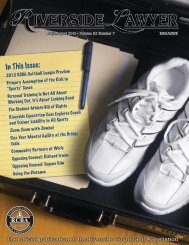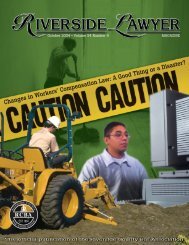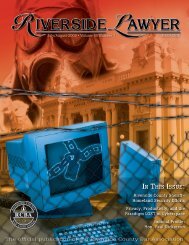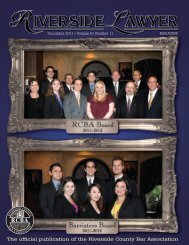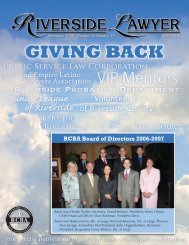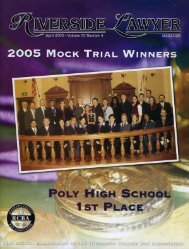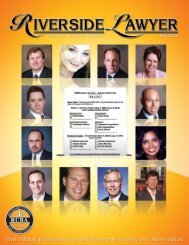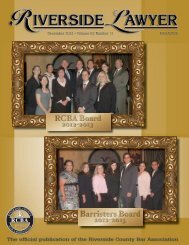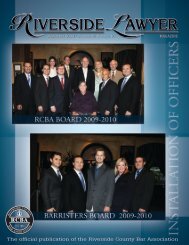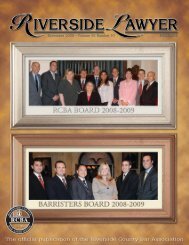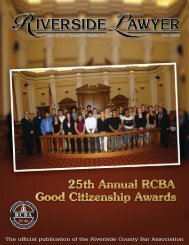In This Issue: - Riverside County Bar Association
In This Issue: - Riverside County Bar Association
In This Issue: - Riverside County Bar Association
You also want an ePaper? Increase the reach of your titles
YUMPU automatically turns print PDFs into web optimized ePapers that Google loves.
Getting Your Client Their Rightful <strong>In</strong>heritance<br />
by Scott Grossman<br />
The client comes to you hurt and angry. You are told<br />
they only want what’s right. You may even hear some<br />
righteous indignation in their voice. After your client<br />
blurts out the family history, maybe shedding some tears,<br />
and insists this is not what mom and dad would ever have<br />
wanted, you realize they are telling you they haven’t gotten<br />
their rightful inheritance.<br />
There is a lot of misinformation, misunderstanding,<br />
and ignorance about how wills, trusts, and probate actually<br />
work. There may be even more confusion surrounding<br />
trust and probate litigation. Understanding why your<br />
client has not gotten their inheritance will help you to<br />
guide them on what is and is not in their own best interest.<br />
There are a number of reasons a beneficiary or heir<br />
may not be getting their inheritance. There are trustees,<br />
executors, and administrators who have no idea what<br />
they’re doing. Literally. They don’t get any type of professional<br />
help and probably told your client they know what<br />
to do because mom or dad told them before they died.<br />
There are trustees, executors, and administrators who<br />
hide their heads in the sand, doing nothing. They “lock<br />
up” and just won’t get down to the business of probate<br />
or trust administration. Some clients are told nothing<br />
is going to happen because all of mom or dad’s property<br />
was used to care for them before they died. Some clients<br />
are told they have been disinherited. There are even more<br />
reasons given by trustees and executors for not giving<br />
your client their inheritance and, of course, no two cases<br />
are identical. However, from your client’s perspective,<br />
most cases can be broadly but accurately categorized into<br />
one of two common situations:<br />
1.<br />
2.<br />
An important document got changed before your client’s<br />
parent’s death, and as a result of that change,<br />
your client is now disinherited.<br />
The document is fine, but your client hasn’t gotten<br />
their inheritance.<br />
Trust and Will Contests<br />
The first scenario will lead to a will or trust contest.<br />
<strong>In</strong> the author’s experience, the two most common reasons<br />
for setting aside a will or trust are lack of mental capacity<br />
and undue influence. Probate Code section 6100.5 sets<br />
forth the standard for testamentary capacity. A person is<br />
not mentally competent to make a will if, at the time of<br />
making the will, he or she:<br />
1. Does not have sufficient mental capacity to:<br />
• understand the nature of the testamentary act,<br />
• understand or recollect the nature and situation of<br />
his or her property, or<br />
• remember and understand his or her relations to<br />
living descendents, spouse, parents, and others<br />
whose interests are affected by the will; or<br />
2. Suffers from a mental disorder with symptoms<br />
including delusions or hallucinations that results in<br />
his or her devising property in a way that, except for<br />
the delusions or hallucinations, he or she would not<br />
have done.<br />
Capacity to create a trust is governed by Probate Code<br />
sections 811 and 812. <strong>In</strong> order to show mental incapacity<br />
of the settlor, your client will need to prove the settlor<br />
had a deficit in his or her alertness and attention,<br />
information processing, thought processes, or ability to<br />
modulate mood and affect. The deficit must correlate<br />
with the decision or act in question.<br />
A particularly thorny question is what standard<br />
applies when a trust amendment is created. An analysis<br />
of this question is beyond the space limitations of this<br />
article. The author recommends that an interested reader<br />
review Andersen v. Hunt (2011) 196 Cal.App.4th 722.<br />
Even if the settlor or testator was mentally competent<br />
when the new document was executed, they may have<br />
been subject to undue influence. <strong>This</strong> is almost always<br />
worth exploring where there was some cognitive impairment<br />
when the new will or trust was created.<br />
California law defines undue influence as conduct<br />
that subjugates the testator’s will to that of another, causing<br />
a disposition different from that which the testator<br />
would have made if permitted to follow his or her own<br />
inclinations. Undue influence is proven when it is shown<br />
that the testator’s freedom to choose was overcome by<br />
someone exerting undue pressure, arguing with the testator,<br />
or using some kind of coercion so the testator could<br />
not make their own choice. Rarely will there be direct<br />
evidence of this conduct. Expect to rely on circumstantial<br />
evidence to prove this allegation.<br />
16 <strong>Riverside</strong> Lawyer, June 2012



